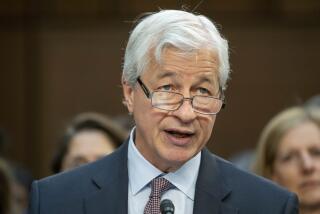Fed Chief Warns on Housing Costs
- Share via
Federal Reserve Chairman Alan Greenspan on Friday issued one of his strongest warnings yet on the dangers of rising housing and stock values, suggesting that prices could tumble just as they have in the past.
Greenspan’s latest remarks were seen as a warning to investors and home buyers who have bid up residential real estate prices by as much as 40% in Southern California and other hot markets in the last two years.
Investors have driven up housing and stock prices partly because the world economy is stable and credit is cheap -- contributing to what Greenspan called a low “risk premium.” But investors can eventually become more cautious, causing prices to decline.
“This is the reason that history has not dealt kindly with the aftermath of protracted periods of low risk premiums,” Greenspan said.
The Fed chief’s statements came in prepared remarks before the prestigious annual Fed conference in Jackson Hole, Wyo. The two-day gathering, hosted by the Federal Reserve Bank of Kansas City, is being used as a tribute to Greenspan’s 18-year tenure before his term ends in January.
At least one prominent analyst said Greenspan was making it clear that the Fed planned to continue raising short-term interest rates, and that would eventually restrict mortgage lending by making it less profitable for banks and others. “All he is doing is issuing a prudent caution flag to investors,” said Allen Sinai, chief global economist at Decision Economics and a conference attendee.
Sinai said reduced availability of cheap mortgages would remove a crucial stimulus fueling dramatic gains in home prices. “Those in the real estate markets ought to be careful,” Sinai said.
The central bank has come under criticism in recent months for fostering conditions that some say have contributed to a housing bubble. Greenspan previously has talked of “speculative fervor” in some local housing markets and has warned about the risks of interest-only loans and other popular mortgages that prompt buyers to stretch their finances to afford expensive homes.
But some economists say Greenspan -- and his eventual successor -- must do even more to cool off the housing market.
Greenspan said Friday that high housing prices were increasingly influencing Fed monetary policy.
“Our forecasts and hence policy are becoming increasingly driven by asset price changes,” the chairman said.
But he stopped short of declaring that the central bank should specifically target asset bubbles. That reinforced the Fed’s official doctrine that trying to influence asset price levels was beyond the Fed’s purview or control. Also, Fed officials say, specifically attacking bubbles could depress the entire economy or inflict other unwanted side effects.
Economists on Friday reaffirmed forecasts that the Fed would lift its benchmark short-term interest rate to at least 4.5% next year, up from 3.5% now. The rate stood at 1% in June 2004, when the central bank starting raising rates.
Greenspan’s latest remarks also were seen as an attempt to cool off housing by pushing up long-term-bond yields, such as on the benchmark 10-year Treasury note. Those yields influence rates on long-term mortgages, but they are determined by investors, not the Fed. Long-term-bond yields rose slightly Friday after Greenspan’s remarks but continued to stay relatively low.
Because bond investors have agendas of their own, Greenspan’s jawboning can’t by itself drive up long-term yields, said Nariman Behravesh, chief global economist at Global Insight, a consulting firm in Waltham, Mass. Likewise, Greenspan’s 1996 comment about “irrational exuberance” in stocks failed to throttle the 1990s bull market.
“Greenspan can try to talk up the long-bond yield and talk down the housing market, but his success will be somewhat limited,” Behravesh said.
Stock prices retreated Friday after Greenspan’s speech, with housing and banking issues among the losers.
Greenspan also warned Friday that creeping trade protectionism and bloated budget deficits threatened the nation’s long-term economic vitality.
“Developing protectionism regarding trade and our reluctance to place fiscal policy on a more sustainable path are threatening what may well be our most valued policy asset: the increased flexibility of our economy,” the Fed chief said.
More to Read
Inside the business of entertainment
The Wide Shot brings you news, analysis and insights on everything from streaming wars to production — and what it all means for the future.
You may occasionally receive promotional content from the Los Angeles Times.










